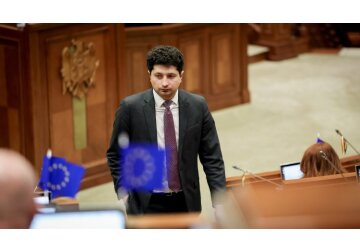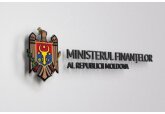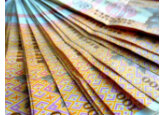
Moldovan Parliament passes in the second reading a draft law introducing limits on cash payments and stimulating non-cash payments.
In particular, this is the draft Law on cash settlements, which regulates the rules of cash settlements and establishes the basic regulatory framework for payment transactions in Moldova. The document will take effect on January 1, 2025. The draft law provides for the clarification of the rules of cash circulation in the economic turnover and orientation towards non-cash settlements. The document is designed to ensure increased transparency and security of transactions, fight against tax evasion and unfair competition, development of digital economy and use of fast payment systems. The provisions of the law will apply to legal entities regardless of their type of ownership and organizational and legal form, with the exception of state authorities and public institutions. The new conditions will apply to non-profit organizations, individuals engaged in entrepreneurial activities, permanent representative offices and branches of non-resident entities, as well as individuals acquiring real estate or vehicles from other individuals. Depending on the category to which it belongs, the peculiarities and frequency of payments, the limit of cash payments will be 100 thousand lei in total, monthly or annually. Also, the limit of cash payments in favor of individuals not engaged in entrepreneurial activity will be 100 thousand lei for one payment. Thus, when buying real estate, cash payment will be accepted only if its amount does not exceed 100 average monthly salaries in the economy (about 1.37 million lei), and when buying vehicles - 50 average monthly salaries in the economy (about 685 thousand lei). At the same time, economic agents will be able to use unlimited cash to pay for labor and other payments arising on the basis of labor relations, to fulfill obligations on loans received from financial entities, to make settlements with institutions and state bodies, to pay tax liabilities, payments and fines to the national budget. The Draft Law also provides for the limitation of commissions applicable to transfer settlements. In particular, commissions or other fees charged by payment service providers from Moldova will not be allowed to exceed 0.1% of the transaction amount by transfer, including for cash withdrawals. Fines from 3% to 10% of the amount will be applied for violating the limits on cash payments and cash withdrawals. The legislative initiative belongs to the Ministry of Finance and was developed on the basis of recommendations formulated in the De-oligarization Plan, approved by the National Commission for European Integration. Chairman of the Commission for Economy, Budget and Finance, Radu Marian, said that many citizens are still skeptical about non-cash transactions, because it is very difficult to deposit money in cash in banks, there is a lot of bureaucracy and many supporting documents are required. On the mentioned draft law, public consultations were held in the Parliament and many suggestions/objections were received. For this reason, in the period between the first and second readings, a working group was organized with the participation of state institutions, consumers, NBM, payment service providers, where they actively worked on improving this draft law and simplifying the procedure of depositing cash into electronic accounts. As a result of the working group’s activity, as well as comments received at the public hearings, a number of changes were made to the draft law in the interest of the consumer. It was decided that the document will take effect on January 1, 2025, and not after 3 months from the date of publication in Monitorul Oficial (the Official Journal of Moldova), as it was supposed earlier. In addition, it was agreed that before the entry into force of this law, NBM, jointly with the Service for Prevention and Combating Money Laundering, will establish clear rules on the basis of which banks will be able to accept supporting documents from consumers, in order to avoid unnecessary bureaucratization. A self-declaration mechanism will also be introduced to ensure that the responsibility for verifying the legitimacy of the source of money deposited by customers with banks and sent to other payment service providers rests not only with commercial banks, but also with government agencies. As a consequence, a customer depositing cash in a bank will have to sign a statement confirming that the sources of his/her income are legitimate and that he/she agrees that state agencies can verify the transaction if necessary. At the public hearings, many citizens complained that the process of depositing cash in banks is very bureaucratic, even if their source of income is legal. They reported that there is no uniform set of rules on how to apply supporting documents (e.g., income statements, loan agreements, etc.) when a person deposits cash in banks, and that banks often employ abusive risk reduction practices. The self-declaration provision will allow the AML Service and BNM to set clear guidelines on how and what documents can be submitted by customers when depositing cash. "This does not mean that people will be able to deposit any amount of cash without the bank asking where the money came from, but we are creating conditions to simplify the procedure. Commercial banks and other suppliers will act knowing that the law also prescribes the state's obligation to verify the source of this money to ensure that it is not derived from money laundering or other criminal activities," Radu Marian said. He also stressed that the law will stipulate that even if the value of a real estate or car purchase transaction exceeds the limits set by the law and the payment should be made electronically, an advance of 200 thousand lei can be made in cash. The MP also recalled that the law sets a maximum ceiling of 0.1% of the commission fee for cash withdrawal at the cash desk for operations related to the purchase of real estate and vehicles, and this ceiling is much lower compared to the approximate commission of about 1% at present, which is applied to certain cash withdrawal operations. Also, according to the NBM regulations, the maximum commission for banking operations via IBAN within the country should not exceed 20 lei. Radu Marian explained that when it comes to currency conversion for transactions of this kind, many commercial banks and payment service providers have shown willingness to offer banking products that minimize conversion costs, if the transaction takes place between bank accounts of the same commercial bank, opening a bank account is a simple operation. Before the law takes effect, practical solutions to this problem will be sought. The MP noted that in the second reading it was decided to delete Article 4 of the bill on the rules of the minimum requirement for cash within 3 days within the company. According to him, these rules were established long ago (back in 1992), they are outdated and impractical for today's economic agents. Radu Marian explained that for individuals who sell crop and/or horticultural products (e.g. walnut kernels), the minimum amount of cash payment is doubled - from 100 thousand to 200 thousand lei per year. He emphasized that horticultural products, especially walnut kernels, are one of the main exports of the Moldovan food industry, and thousands of citizens sell their home products to buyers/intermediaries. Since most of the individuals selling these products come from rural areas where banking services/electronic payments are not very common, it is considered necessary to increase this ceiling. For intermediaries/buyers in the crop/gardening sector, the maximum amount of authorized cash payments has been increased from 100 lei to 600 thousand lei per year, as they purchase products from the above-mentioned individuals. Also, within the second reading of the draft law, it was excluded the necessity for notaries to check, at the stage of certifying the sale contracts, whether the payment for the goods (real estate, vehicles) was made by transfer (if it exceeds the limits). Radu Marian explained that it will be very difficult to ensure this control, especially in situations where payment for the purchased goods will be made in installments. Especially since, as a rule, the payment for the goods is made after the authentication of the sales contract, which would make it even more difficult for notaries to verify the method of payment of the price of goods at the authentication stage. // 29.02.2024 – InfoMarket







